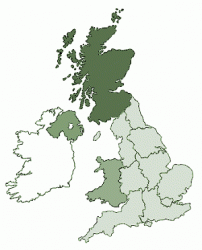Ofcom Moot FREE Broadband Ceases for BT Lines in UK Rural Areas

The communications regulator has today posted a further consultation for its on-going review into the UK’s Wholesale Broadband Access (WBA) market, which among other things examines the impact of BT’s FTTC/P deployment in rural areas and also proposes free cease charges.
Ofcom currently classifies different areas of the country based upon the amount of competition from primary ISPs (e.g. BT, TalkTalk, Sky Broadband, Virgin Media etc.) in any given area (i.e. Market 1, Market 2, Market 3 and Hull). In short, Market 3 areas are home to several ISPs and thus have the lowest prices due to de-regulation and competition; while Market 1 is the opposite and services are often only available from BT (i.e. Market 1 currently equates to the last 11.7% of premises in predominantly rural areas).
Advertisement
But the markets have changed since the original review (2010), which is largely due to the expansion of unbundled (LLU) copper broadband services. Local Loop Unbundling is the process that allows ISPs like TalkTalk and Sky Broadband to gain more control of broadband and phone lines by installing their own equipment inside BT’s exchanges. As a result Ofcom last year prosed to consider changing their definition to the following (here):
Market A
Where there are only one or two potential significant wholesale broadband providers present or forecast to be present, which accounts for 9.6% of UK premises.Market B
In which we believe there is effective competition, accounting for 89.7% of premises (exchange areas where there are three or more primary ISPs present or forecast to be present).Hull Area
Covers 0.7% of UK premises, where KCOM (KC) is the only significant provider.
In other words, Market A (mostly rural areas) lacks the necessary level of competition and would thus remain subject to Ofcom’s price controls and cost accounting obligations on BT. At the time the regulator also proposed that cease charges (i.e. when you cancel the broadband line rather than use a direct migration) for only BT’s IPstream Connect Max and Max Premium (up to 8Mbps ADSL) broadband products should be set to £0. But today’s proposals said that this should now be extended “to cover all cease charges in Market A“.
BT currently charges for cessations from other variants of IPstream within the existing Market 1 (for example IPstream Connect Home and IPstream Connect Office cessations are £5.41) and WBC cessations are also £5.41, which is often passed on by ISPs to consumers. So the news that they’ll all be set to £0 under the new Market A is welcome, although the impact of this is debatable given that some ISPs still charge a set cease fee no matter where you live.
Market Definitions and Fibre (FTTx) Coverage
At the time Ofcom also chose not to factor in the roll-out of superfast fibre optic based broadband services (FTTC/P) to its Market Definitions, either on a state-funded (Broadband Delivery UK) or commercially-funded basis, because they were “unable to take account of that roll-out in our market analysis, as we did not know where or when the roll-out would take place“.
Advertisement
But since then EE has claimed that many proposed Market A exchanges could be moved to Market B because “BT [are] likely to face strong competition in the supply of WBA services in those (Market A) exchanges as a result of fibre roll-out“. EE further suggested that, where 40% or more of premises within a Market A exchange area are capable of being served by state-funded fibre by 2017, then the exchange should be regarded as “prospectively competitive” and moved to Market B.
The heavily redacted information provided to Ofcom by BT in October 2013 shows that fibre connected to Market B (i.e. prospectively competitive) exchanges is likely to reach between 50% and 70% of Market A premises by the end of the next market review period (i.e. around 2017), with around two thirds of these “being in Market A exchange areas in which BT is currently the only [Primary Operator]“.
Ofcom noted that FTTC in particular would require its model to focus more on street cabinets rather than telephone exchanges for coverage, although it ultimately felt that no change was necessary yet because “only 200-300 out of 3,223 exchanges in Market A have one or more fibre-enabled cabinets as of October 2013” and they “serve only 10 to 15% of Market A premises” (note: there are around 90,000 cabinets in the UK). But it has promised to look at the issue again in the future, most likely after BDUK has had a bit longer to run.
A full run down of all the latest WBA market review changes can be found here and the consultation will remain open until 10th March 2014.
Advertisement
NOTE: The regulators proposals to deregulate 90% (roughly) of the UK relate to the broadband services provided by BTWholesale.
Mark is a professional technology writer, IT consultant and computer engineer from Dorset (England), he also founded ISPreview in 1999 and enjoys analysing the latest telecoms and broadband developments. Find me on X (Twitter), Mastodon, Facebook, BlueSky, Threads.net and Linkedin.
« UPDATE2 UK ISP Sky Broadband Shield Blocking Critical jQuery Website






















































Comments are closed